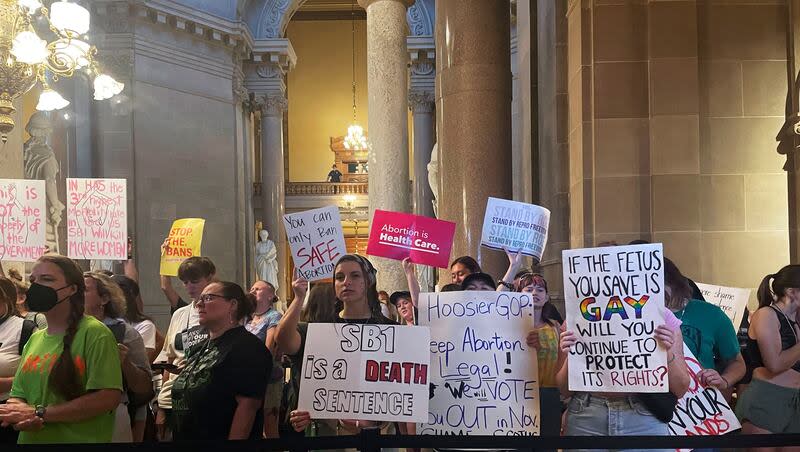Why Indiana’s abortion ban (still) can’t be enforced against some people of faith

The Indiana Court of Appeals on Thursday ruled that an injunction blocking the state from enforcing its near-total ban on abortion against some people of faith can remain in place as their religious freedom challenge to the law works its way through the legal system.
The key question in the underlying case is whether Indiana’s abortion law violates state-level religious freedom protections by preventing people from letting their faith guide their health decisions.
Indiana’s abortion law
Indiana, like many states, passed new abortion restrictions soon after the Supreme Court overturned Roe v. Wade in June 2022.
In Indiana, abortion is now prohibited in nearly all cases. The procedure is only available in limited circumstances involving rape, incest or a serious threat to the mother’s health.
Hoosier Jews for Choice and a group of unnamed religious women challenged the law soon after it was passed, arguing that it violated Indiana’s Religious Freedom Restoration Act.
In December 2022, they were granted an injunction that prevents the state from enforcing the abortion policy against them. Thursday’s ruling comes in response to the state’s appeal of that injunction.
New ruling on Indiana’s abortion law
The Indiana Court of Appeals on Thursday upheld much of the trial court’s ruling, saying, among other things, that the religious women involved in the case do have standing to sue despite not being pregnant.
The court said that the injunction can remain in place, although it instructed the lower court to clarify possible exceptions to the injunction.
The ruling also allows the case to move forward as a class-action suit, which means that other people of faith that have religious freedom concerns about Indiana’s abortion law can join the lawsuit.
“For many Hoosiers, the ability to obtain an abortion is necessary based on a sincerely held religious belief,” said Ken Falk, ACLU of Indiana’s legal director, in a statement on the ruling. “The burden placed on these individuals by Indiana’s abortion ban is absolute and life-altering. The Religious Freedom Restoration Act is clear that it protects religious freedom for all Hoosiers, and the Court of Appeals’ decision today reflects that clear directive.”
The new ruling was focused on the preliminary injunction, not the case as a whole. It remains to be seen whether the religious freedom challenge will lead to permanent changes to Indiana’s abortion law.
Abortion and religious freedom
The Indiana case is one of several cases filed since June 2022 that asks whether religious freedom law guarantees a right to abortion access.
People of faith are still waiting for a ruling on that question in Missouri and Kentucky, according to ABC News.
The same question about the relationship between abortion law and religious freedom law nearly derailed passage of the federal Religious Freedom Restoration Act three decades ago. Major Catholic groups withheld their support until it was clear that the Supreme Court would not be overturning Roe v. Wade anytime soon, as the Deseret News previously reported.
Religious freedom experts have told the Deseret News that the conservative majority is very unlikely to side with people of faith if one of these faith-based, state-level challenges to abortion bans makes it to the U.S. Supreme Court.
“They care about abortion a lot more than they care about religious liberty for religious views they disagree with. That’s the realist answer,” said Doug Laycock, a professor of law and religious studies at the University of Virginia, to the Deseret News in 2022.

